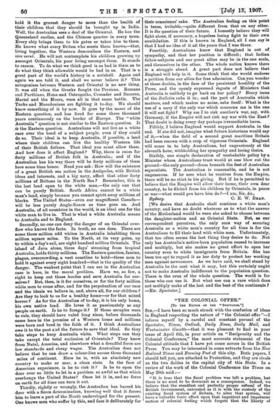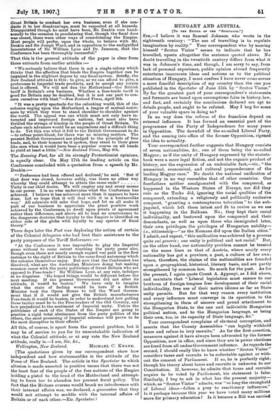"THE COLONIAL OFFER."
70 THE EDITOR OP THE " SPECTLT0141
Sirt,—I have been so much struck with the confusion of ideas in England respecting the nature of " the Colonial offer• "—I inform myself by a careful and constant perusal of the Spectator, Times, Outlook, Daily News, Daily Mail, and Westminster Gazette—that it was pleasant to find in your issue of April Gth, in your article on " Reciprocity and the Colonial Conference," the most accurate statement of the Colonial attitude that I have yet come across in the British Press. You may be interested in some extracts from the New Zealand Times and Evening Post of this city. Both papers, I should tell you, are attached to Protection, and they are rivals as the two dailies in the capital city of this State. In a review of the work of the Colonial Conference the Times on May 20th said:-
" It is true that the fiscal problem was left a problem, but there is no need to be downcast as a consequence. Indeed, we believe that the steadfast and perfectly proper refusal of the British Government, entrusted as it is with the custody of the existing fiscal system of Britain, to alter that system, will have a valuable tonic effect upon that impatient and impetuous section of colonial feeling which forgets that the liberty of , Great Britain to conduct her own business, even if she con- ducts it to her disadvantage, must be respected at all hazards. Disappointed though he must have been, Mr. Deakin rose hand- somely to the occasion in proclaiming that, though the fiscal door was closed, there were other ways of consolidating the Empire. Most people will prefer, upon the whole, to believe with Mr. Deakin and Sir Joseph Ward, and in opposition to the undignified lamentations of Sir William Lyne and Dr. Jameson, that the Conference has been thoroughly successful."
That this is the general attitude of the paper is clear from these extracts from earlier articles :- " We seriously believe that there is not a single colony which thinks that the affection that binds the Empire together can be impaired in the slightest degree by any fiscal system. Briefly, the New Zealand attitude is this: to give, as we can afford to give, a preference to Imperial trade products, and to accept any return that is offered. We will not dun the Motherland—the British tariff is Britain's own business. Whether a free-trade tariff is good for Britain may be doubted, but it is not our part to con- cern ourselves with that."—New Zealand Times, April 9th.
"It was a pretty spectacle for the onlooking world, this of the colonies urging upon the Motherland a league of mutual assist- ance by which they were to stand shoulder to shoulder against the world. The appeal was one which must not only have in- terested and impressed foreign nations, but must also have thrilled the strings of kinship in the people of Great Britain. To refuse such advances would be an ungracious and a difficult thing to do. Yet this was what it fell to the British Government to do —to refuse point-blank, for there was no mincing matters. The present British Government are pledged to the principle of free trade, and, to their honour be it spoken, they stood to their guns like men_ when it would have been a popular course on all hands to yield at least a little."—New Zealand Times, May 8th.
The Evening Post, for all its strongly Protectionist opinions, is equally clear. On May 17th its leading article on the
Conference concluded with a quotation from a speech by Mr Deakin
"' Preference had been offered and declined,' he said But if that door was closed, however softly, was there no other way whereby they could attempt to attain the same ends P Unity is our chief desire. We will employ any and every means in our power. I in no wise undervalue what the Conference has achieved. I believe it has achieved more than it appears to have done. Let us hope that it will deal with it in a businesslike way.' All colonists will echo that hope, and let us all make it part of our business to appreciate the great positive work achieved by the Conference, to dwell upon points of agreement rather than difference, and above all to lend no countenance to the dangerous doctrine that loyalty to the Empire is identified on either side of the globe with loyalty to any species of fiscal theory."
Three days later the Post was deploring the action of certain of the Colonial delegates who bad lent their assistance to the party purposes of the Tariff Reformers
"At the Conference it was impossible to play the Imperial game without to some extent touching the party game also, though even there not nearly enough regard was paid in the first instance to the right of Britain to the same fiscal autonomy which the colonies themselves enjoy. But now that the Conference has dissolved, what are the Australian Ministers doing but making common cause with the party politicians of Great Britain who are opposed to Free-trade ? Sir William Lyne, at any rate, indulges in no disguises. 'He hoped things would be different before the next meeting. If the present Government did not alter its attitude, it would bo beaten.' We have only to imagine what the state of feeling would be here if a British Minister took the Opera House to tell the Ward Govern- ment that if it would not give the British manufacturers Free-trade it would be beaten, in order to understand how galling these tactics must be to the Free-traders of the Old Country, and how prejudicial to the sentiment of Imperial unity. Unless the politicians of each of the States of the Empire are going to practise a rigid total abstinence from the party politics of the others, the most promising of Imperial schemes will prove to be the most disruptive in their effects."
All this, of course, is apart from the general problem, but it may be of service to you for its unmistakable indication of what the Colonial attitude, or at any rate the New Zealand.
attitude, really am, Sir, &c.,
[The quotations given by our correspondent show how independent and how statesmanlike is the attitude of the Press of New Zealand. The article in the Spectator to which allusion is made asserted in positive terms that there was not the least fear of the people of the free nations of the Empire holding a pistol to the head of the Motherland and attempt- ing to force her to abandon her present fiscal policy. The fact that the Britons oversew would brook no interference with their internal affairs was, we declared, a guarantee that they would not attempt to meddle with the internal affairs of Britain or of each other.—En. Spectator.1







































 Previous page
Previous page